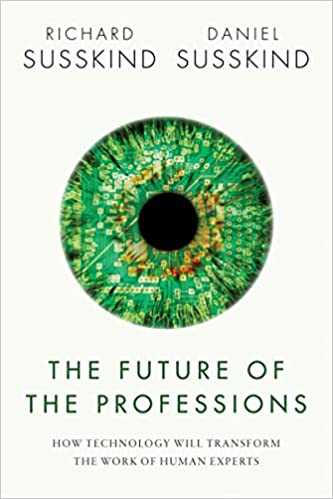Why Read It
The book is discussable for sure. Its authors Richard and Daniel Susskind are already well mentioned in the media space. You could find dozens of videos, podcasts, and articles with these guys if you just google their names. Their forecast of the future labor became viral and discussible on the structures from TED to Oxford.
This book is simply a must-read
Overview
“The Future of Professions” discusses how fast scalable industries like software engines might make some of the currently demanding professions obsolete. The authors see two possible futures for this phenomenon: the first option is just a more efficient version of what we have today, and the second one is an appearance of completely new machines and inventions that could replace professions in their current understanding.
Interesting Points
Two Options Are Parallel
The argument the authors developed is that for now, these two futures are developing in parallel, but still, the second future will dominate eventually. Some problems that traditionally are solved only by human professionals would be solved by technologies and machines.
8 Objections
The refusing of such professions as doctors, lawyers, teachers, accountants, and so on might be problematic, that is an obvious fact. The book offers the 8 common objections for the second future: trust objection, moral limits objection, lost-craft objection, personal-interaction objection, empathy objection, good-work objection, becoming-expert objection, and no-future-roles objection. Each of them is explained in an objective, well-illustrated, and balanced way.
Trust Challenge
The idea I liked the most is an explanation for the first objection, trust objection. The book says that basically all reasons why people ask for a trusted advisor to solve their problems are divisible into two groups: reliability and trustworthiness. Reliability means when someone is going to professional whether a doctor or lawyer or teacher, they want to get an expected behavior. Today we can see on living examples like eBay that reliability is enough to shift from human professionals to technologies.
But some of these reasons are more complicated, and these reasons belong to the trustworthiness group. When it comes to it, there are still some solutions and services that include some moral principles, human intuition, creativity, or good motivation. And this is the new challenge that the future has to complete. The authors suppose that the development of AI technologies might be an answer.
Next Book: Weapons of Math Destruction: How Big Data Increases Inequality and Threatens Democracy
Let’s get even more anxious next week! The author, mathematician and data scientist Cathy O’Neil, will show us the dark side of Big Data. How machines and algorithms can influence our lives and how the great invention at the first could become a dangerous weapon eventually — we’ll read in the next book.

